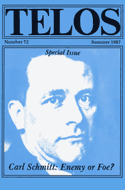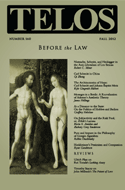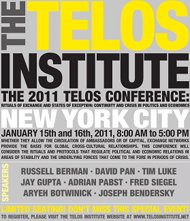By Kenneth D. Johnson · Monday, February 8, 2016 Kenneth D. Johnson is affiliated with the William J. Seymour Institute for Black Church and Policy Studies, in Boston. The following paper was presented at the 2016 Telos Conference, held on January 16–17, 2016, in New York City. For news about upcoming conferences and events, please visit the Telos-Paul Piccone Institute website.
Introduction
The spate of killings of unarmed African American males by police and vigilante residents has continued to roil public opinion in the black community, leading to various forms of social protest, in particular by varied groups of young adult African Americans.
Preeminent among these groups is #BlackLivesMatter, which now aspires to become a national movement, sometimes in coalition with other contemporary groups formed near the same time, and displacing older Civil Rights groups and the Black Church’s ethical and protest traditions.
While #BlackLivesMatter has partly instrumentalized Black Church social protest tradition, it has done so in the service of a fundamentally secular set of ethical commitments. In the process, the #BlackLivesMatter movement has discarded the internal resources of self-critique that Black Church ethical praxis provides.
Continue reading →
By Robert Wyllie · Tuesday, July 30, 2013 As an occasional feature on TELOSscope, we highlight a past Telos article whose critical insights continue to illuminate our thinking and challenge our assumptions. Today, Robert Wyllie looks at Richard Faber’s “The Rejection of Political Theology: A Critique of Hans Blumenberg,” from Telos 72 (Summer 1987).
 In “The Rejection of Political Theology: A Critique of Hans Blumenberg,” Richard Faber reconstructs two alternatives to Carl Schmitt’s political theology. Faber draws the first alternative from Hans Blumenberg. Blumenberg, whose later work explores how metaphor orients thought, proposes a “polytheistic” alternative to “monotheistic” political theology. Polytheism is an early modern metaphor for plural sovereignty, underlying the checks and balances of liberalism. Sympathetically, Blumenberg believes a polytheistic political theology turns away from Schmitt’s “monotheistic” picture of sovereignty where one sovereign decides the state of exception. After expositing Blumenberg’s polytheistic political theology, Faber rejects it. Instead, he turns to Walter Benjamin’s eschatological political theology. Monotheists have been promised an apocalypse, a violent divine intervention, to restore justice in the future. Unlike the Schmittian state of exception, this hoped-for intervention would ground no new legal constitution. Benjamin radicalizes the state of exception into the “pure violence” of a Marxist revolution aimed at destroying the political state altogether. In “The Rejection of Political Theology: A Critique of Hans Blumenberg,” Richard Faber reconstructs two alternatives to Carl Schmitt’s political theology. Faber draws the first alternative from Hans Blumenberg. Blumenberg, whose later work explores how metaphor orients thought, proposes a “polytheistic” alternative to “monotheistic” political theology. Polytheism is an early modern metaphor for plural sovereignty, underlying the checks and balances of liberalism. Sympathetically, Blumenberg believes a polytheistic political theology turns away from Schmitt’s “monotheistic” picture of sovereignty where one sovereign decides the state of exception. After expositing Blumenberg’s polytheistic political theology, Faber rejects it. Instead, he turns to Walter Benjamin’s eschatological political theology. Monotheists have been promised an apocalypse, a violent divine intervention, to restore justice in the future. Unlike the Schmittian state of exception, this hoped-for intervention would ground no new legal constitution. Benjamin radicalizes the state of exception into the “pure violence” of a Marxist revolution aimed at destroying the political state altogether.
Continue reading →
By Kyle Gingerich Hiebert · Monday, October 29, 2012 Kyle Gingerich Hiebert’s “The Architectonics of Hope: Apocalyptic Convergences and Constellations of Violence in Carl Schmitt and Johann Baptist Metz” appears in Telos 160 (Fall 2012). Read the full version online at the Telos Online website, or purchase a print copy of the issue here.
 This essay traces the apocalyptic re-emergence of political theology in late modernity in the work of the jurist Carl Schmitt and the theologian Johann Baptist Metz. Broadly speaking, the intellectual fault line between these two German Catholics can be provisionally drawn with reference to Hegel. On the one hand, Schmitt¹s lineage can be traced back through the conservative Catholic political philosophers of the counterrevolution (Bonald, de Maistre, and Cortés) to what amounts to, in very broad strokes, a political theology of the Hegelian Right. On the other hand, Metz¹s sympathies in his development of the new political theology clearly lie with the revisionary Marxists of the Frankfurt School (Adorno, Benjamin, and Bloch), which binds his intellectual heritage, again in very broad strokes, to the Hegelian Left. This way of putting the matter quite easily lends itself to interpretations that argue the relationship between Schmitt and Metz is straightforwardly oppositional. While perhaps conceptually useful, I argue that any easy conservative/critical dichotomy here obscures as much as it illuminates because it proffers too undifferentiated an account of the interrelationship between Schmitt and Metz. Alternatively, I suggest that the apocalyptic tone that infuses their respective accounts of political theology is the most adequate key for understanding how they function as different expressions of what I call an architectonics of hope; a reconfiguration of political theology that is structural in nature, animated by a thoroughly negative theological anthropology and that tragically acquiesces to the ongoing necessity of violence. In the end, then, Schmitt and Metz stand much closer to each other than currently realized. This essay traces the apocalyptic re-emergence of political theology in late modernity in the work of the jurist Carl Schmitt and the theologian Johann Baptist Metz. Broadly speaking, the intellectual fault line between these two German Catholics can be provisionally drawn with reference to Hegel. On the one hand, Schmitt¹s lineage can be traced back through the conservative Catholic political philosophers of the counterrevolution (Bonald, de Maistre, and Cortés) to what amounts to, in very broad strokes, a political theology of the Hegelian Right. On the other hand, Metz¹s sympathies in his development of the new political theology clearly lie with the revisionary Marxists of the Frankfurt School (Adorno, Benjamin, and Bloch), which binds his intellectual heritage, again in very broad strokes, to the Hegelian Left. This way of putting the matter quite easily lends itself to interpretations that argue the relationship between Schmitt and Metz is straightforwardly oppositional. While perhaps conceptually useful, I argue that any easy conservative/critical dichotomy here obscures as much as it illuminates because it proffers too undifferentiated an account of the interrelationship between Schmitt and Metz. Alternatively, I suggest that the apocalyptic tone that infuses their respective accounts of political theology is the most adequate key for understanding how they function as different expressions of what I call an architectonics of hope; a reconfiguration of political theology that is structural in nature, animated by a thoroughly negative theological anthropology and that tragically acquiesces to the ongoing necessity of violence. In the end, then, Schmitt and Metz stand much closer to each other than currently realized.
Continue reading →
By David Pan · Monday, March 7, 2011 This paper was presented at the 2011 Telos Conference, “Rituals of Exchange and States of Exception: Continuity and Crisis in Politics and Economics.”
 When we consider the metaphysical foundations of our world, we must make a basic choice between a universal conception of metaphysics and a relativist one. This choice commits us to either of two possibilities for world order. With a universalist conception, world order will evolve through a gradual establishment of one universal metaphysical structure that will establish its universality everywhere. With the relativist conception, world order can only consist of a set of agreements and rituals that can be established between a number of separate spaces, each of which is organized according to its own metaphysical structure. The choice for one or the other of these perspectives is consequently a fundamental one that will have far-reaching consequences for our conception of politics in a global context. When we consider the metaphysical foundations of our world, we must make a basic choice between a universal conception of metaphysics and a relativist one. This choice commits us to either of two possibilities for world order. With a universalist conception, world order will evolve through a gradual establishment of one universal metaphysical structure that will establish its universality everywhere. With the relativist conception, world order can only consist of a set of agreements and rituals that can be established between a number of separate spaces, each of which is organized according to its own metaphysical structure. The choice for one or the other of these perspectives is consequently a fundamental one that will have far-reaching consequences for our conception of politics in a global context.
Continue reading →
|
|
 In “The Rejection of Political Theology: A Critique of Hans Blumenberg,” Richard Faber reconstructs two alternatives to Carl Schmitt’s political theology. Faber draws the first alternative from Hans Blumenberg. Blumenberg, whose later work explores how metaphor orients thought, proposes a “polytheistic” alternative to “monotheistic” political theology. Polytheism is an early modern metaphor for plural sovereignty, underlying the checks and balances of liberalism. Sympathetically, Blumenberg believes a polytheistic political theology turns away from Schmitt’s “monotheistic” picture of sovereignty where one sovereign decides the state of exception. After expositing Blumenberg’s polytheistic political theology, Faber rejects it. Instead, he turns to Walter Benjamin’s eschatological political theology. Monotheists have been promised an apocalypse, a violent divine intervention, to restore justice in the future. Unlike the Schmittian state of exception, this hoped-for intervention would ground no new legal constitution. Benjamin radicalizes the state of exception into the “pure violence” of a Marxist revolution aimed at destroying the political state altogether.
In “The Rejection of Political Theology: A Critique of Hans Blumenberg,” Richard Faber reconstructs two alternatives to Carl Schmitt’s political theology. Faber draws the first alternative from Hans Blumenberg. Blumenberg, whose later work explores how metaphor orients thought, proposes a “polytheistic” alternative to “monotheistic” political theology. Polytheism is an early modern metaphor for plural sovereignty, underlying the checks and balances of liberalism. Sympathetically, Blumenberg believes a polytheistic political theology turns away from Schmitt’s “monotheistic” picture of sovereignty where one sovereign decides the state of exception. After expositing Blumenberg’s polytheistic political theology, Faber rejects it. Instead, he turns to Walter Benjamin’s eschatological political theology. Monotheists have been promised an apocalypse, a violent divine intervention, to restore justice in the future. Unlike the Schmittian state of exception, this hoped-for intervention would ground no new legal constitution. Benjamin radicalizes the state of exception into the “pure violence” of a Marxist revolution aimed at destroying the political state altogether.  This essay traces the apocalyptic re-emergence of political theology in late modernity in the work of the jurist Carl Schmitt and the theologian Johann Baptist Metz. Broadly speaking, the intellectual fault line between these two German Catholics can be provisionally drawn with reference to Hegel. On the one hand, Schmitt¹s lineage can be traced back through the conservative Catholic political philosophers of the counterrevolution (Bonald, de Maistre, and Cortés) to what amounts to, in very broad strokes, a political theology of the Hegelian Right. On the other hand, Metz¹s sympathies in his development of the new political theology clearly lie with the revisionary Marxists of the Frankfurt School (Adorno, Benjamin, and Bloch), which binds his intellectual heritage, again in very broad strokes, to the Hegelian Left. This way of putting the matter quite easily lends itself to interpretations that argue the relationship between Schmitt and Metz is straightforwardly oppositional. While perhaps conceptually useful, I argue that any easy conservative/critical dichotomy here obscures as much as it illuminates because it proffers too undifferentiated an account of the interrelationship between Schmitt and Metz. Alternatively, I suggest that the apocalyptic tone that infuses their respective accounts of political theology is the most adequate key for understanding how they function as different expressions of what I call an architectonics of hope; a reconfiguration of political theology that is structural in nature, animated by a thoroughly negative theological anthropology and that tragically acquiesces to the ongoing necessity of violence. In the end, then, Schmitt and Metz stand much closer to each other than currently realized.
This essay traces the apocalyptic re-emergence of political theology in late modernity in the work of the jurist Carl Schmitt and the theologian Johann Baptist Metz. Broadly speaking, the intellectual fault line between these two German Catholics can be provisionally drawn with reference to Hegel. On the one hand, Schmitt¹s lineage can be traced back through the conservative Catholic political philosophers of the counterrevolution (Bonald, de Maistre, and Cortés) to what amounts to, in very broad strokes, a political theology of the Hegelian Right. On the other hand, Metz¹s sympathies in his development of the new political theology clearly lie with the revisionary Marxists of the Frankfurt School (Adorno, Benjamin, and Bloch), which binds his intellectual heritage, again in very broad strokes, to the Hegelian Left. This way of putting the matter quite easily lends itself to interpretations that argue the relationship between Schmitt and Metz is straightforwardly oppositional. While perhaps conceptually useful, I argue that any easy conservative/critical dichotomy here obscures as much as it illuminates because it proffers too undifferentiated an account of the interrelationship between Schmitt and Metz. Alternatively, I suggest that the apocalyptic tone that infuses their respective accounts of political theology is the most adequate key for understanding how they function as different expressions of what I call an architectonics of hope; a reconfiguration of political theology that is structural in nature, animated by a thoroughly negative theological anthropology and that tragically acquiesces to the ongoing necessity of violence. In the end, then, Schmitt and Metz stand much closer to each other than currently realized.  When we consider the metaphysical foundations of our world, we must make a basic choice between a universal conception of metaphysics and a relativist one. This choice commits us to either of two possibilities for world order. With a universalist conception, world order will evolve through a gradual establishment of one universal metaphysical structure that will establish its universality everywhere. With the relativist conception, world order can only consist of a set of agreements and rituals that can be established between a number of separate spaces, each of which is organized according to its own metaphysical structure. The choice for one or the other of these perspectives is consequently a fundamental one that will have far-reaching consequences for our conception of politics in a global context.
When we consider the metaphysical foundations of our world, we must make a basic choice between a universal conception of metaphysics and a relativist one. This choice commits us to either of two possibilities for world order. With a universalist conception, world order will evolve through a gradual establishment of one universal metaphysical structure that will establish its universality everywhere. With the relativist conception, world order can only consist of a set of agreements and rituals that can be established between a number of separate spaces, each of which is organized according to its own metaphysical structure. The choice for one or the other of these perspectives is consequently a fundamental one that will have far-reaching consequences for our conception of politics in a global context. 






